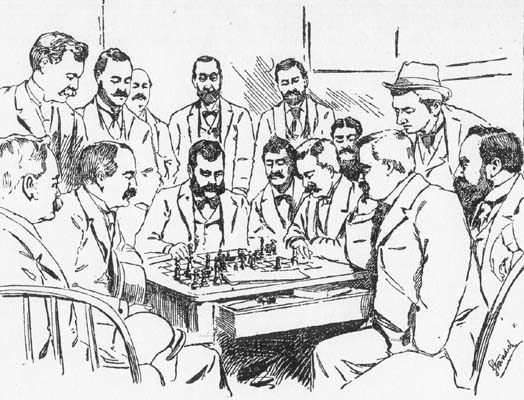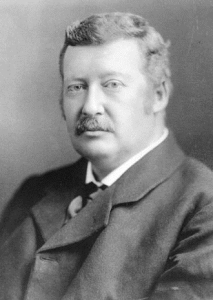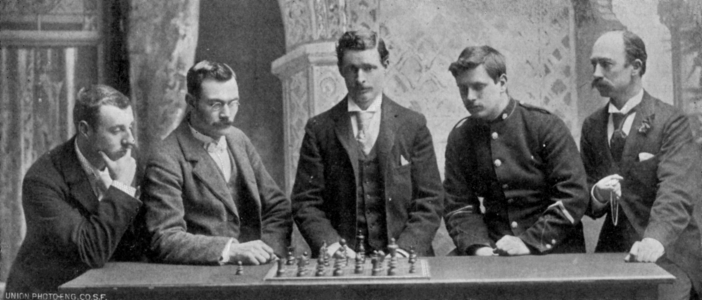A Tale of Three Cities: the 1895/97 Pacific Cable Matches
by Stephen Wright (originally published in En Passant, December 1999)
San Francisco vs. Victoria
The year was 1895. The chess world was buzzing about the international cable match between the Manhattan Chess Club and a team in London, England, which took place on March 9. One interested observer was Mr. W. Christie, manager of the C.P.R. Telegraph Co. in Victoria, B.C. Deciding that this would be an excellent way to advertise his company, he offered the Victoria Chess Club free use of the telegraph for a match with San Francisco players. After negotiations an agreement was reached to play a two-game match, with a team of players in consultation on each board; the match subsequently took place on the night of 31 May - 1 June 1895.
The Players
Foremost among the Victoria team were two Englishmen, Thomas H. Piper (1857-1938) and James R. Hunnex (1854-1938); their arrival from London in 1894 had led to an upswing in the fortunes of the Victoria Chess Club. Piper had once beaten the English champion Joseph Blackburne, and could fairly claim to be the strongest player on the West coast; in 1896 he defeated Joseph Babson, the former president of the Montréal Chess Club, in a match by the score of 7-2. Hunnex played in a few events in 1895 but thereafter seems to have retired from competitive chess, although he was an honorary Vice-president of the B.C. Chess Federation in 1916.
Three of the other Victoria players were from the same family: Peter J.A. Schwengers (1844?-1898) and his sons Conrad (1874-1954) and Bernhard (1880-1946). Peter Schwengers had emigrated to Victoria from Prussia in 1887, and had scored a victory over Louis Paulsen at Düsseldorf 1863. Neither of his sons had much impact on the chess world, but Bernhard later became Canadian singles tennis champion in 1911-1912.
Originally from Sweden, Aaron Gonnason (1865-1938) was a prominent personage in Victoria chess circles for many years. He donated at least two trophies bearing his name, one for the Victoria city championship (which he himself won in 1922), the other for an intercity provincial team championship. And the last member of the team was English-born Dr. Griffith Hands (1837?-1924), a class 2 player at the Victoria club.
The San Francisco players were all members of the Mechanics' Institute; the best known was sometime San Francisco and State champion Dr. Walter R. Lovegrove (1869-1956).
Propaganda
The San Franciscans regarded their city as the chess centre of the Pacific and assumed that
the unknown Canadians would put up scant resistance. This over-confident view was expounded
by the San Francisco Chronicle: "Lovegrove or Quiroga may strike terror into the heart of the
north by some brilliant combination beyond the scope of the ordinary mortal, but within the
reach of genius." By contrast, the Victorians were quietly confident in their English stars:
"It is safe to predict that Victoria will not take second honors in the match, and though our
American cousins are jubilant over an anticipated easy triumph, a surprise may be in store
for them." One of the players remarked that "I'm not afraid of San Francisco, but of the
man from New York," a reference to Wilhelm Steinitz and his recently published Modern Chess
Instruction Part 2, accessible to the San Francisco players but apparently not yet available
in Victoria - even a hundred years ago players were concerned about keeping up with the
latest theory!

[Event "Telegraph match SF - Vict"]
[Site "?"]
[Date "1895.05.31"]
[Round "?"]
[White "San Francisco"]
[Black "Victoria"]
[Result "0-1"]
[ECO "C14"]
[Annotator "Thomas H. Piper"]
[PlyCount "84"]
[EventDate "1895.05.31"]
[EventType "team"]
1. e4 e6 2. d4 d5 3. Nc3 Nf6 4. Bg5 Be7 5. Bxf6 Bxf6 6. e5 Be7 7. Qg4 O-O 8.
Bd3 c5 9. Qh3 h6 10. Nf3 ({Better was} 10. f4 {followed by 0-0-0.}) 10... Nc6
11. dxc5 Bxc5 12. O-O {Against the spirit of the opening which calls for 0-0-0
and a rapid advance of the King's pawns.} f5 {Closing an important diagonal
and freeing Black's game.} 13. a3 a6 14. b4 {Objectionable on general
principles as it leaves the queenside weak.} Ba7 15. Rae1 Bd7 16. Re2 Rc8 {
Giving Black a clear superiority. Compare the previous note.} 17. Nb1 b5 {
Paralysing White's queenside.} 18. Kh1 Ne7 19. Ng1 {Imitating his Grace of
York who "marched his army up a hill, then marched it down again."} Bc6 {A
forcible reply to White's last move; the two bishops threaten to rake the
board.} 20. f4 d4 21. Qh4 {A tacit confession of failure in the attack.} Nd5
22. Qxd8 Rfxd8 23. Nd2 Ne3 {The most potent square the knight could occupy.}
24. Rc1 g5 {Which rudely shoves the White egg off the wall. Vain were now the
efforts of "all the King's horses and all the King's men."} 25. fxg5 hxg5 26.
Nh3 g4 {Tempting the White knight to enter the Cretan maze at g5 whence he
would never emerge.} 27. Nf4 Kf7 28. Nf1 Nd5 29. Nxd5 Bxd5 30. Kg1 Rc3 31. Ra1
Be4 32. a4 Bxd3 33. cxd3 Rd7 34. axb5 axb5 35. Ng3 {Threatening Nxf5.} Ke7 36.
Rea2 Bb8 37. Ne2 Rxd3 38. Nf4 Re3 39. Rd2 Bxe5 40. Nd3 Bd6 41. Ra6 e5 42. g3 e4
{White gracefully resigned. The Bradford attack has it is true been played in
first-class tournaments, but the continuation selected by White at their 10th
move was decidely inferior; besides "quod licet jovi, non licet bovi" [what is
permitted to Jupiter is not permitted to the ox].} 0-1
[Event "Telegraph match SF - Vict"]
[Site "?"]
[Date "1895.05.31"]
[Round "?"]
[White "Victoria"]
[Black "San Francisco"]
[Result "0-1"]
[ECO "D07"]
[Annotator "Thomas H. Piper"]
[PlyCount "84"]
[EventDate "1895.05.31"]
[EventType "team"]
1. d4 d5 2. c4 e6 ({If Black takes the offered pawn he cannot maintain it as
in the King's Gambit, e.g.,} 2... dxc4 3. e3 b5 4. a4 c6 5. axb5 cxb5 6. Qf3 {
, winning a piece.}) 3. Nc3 Nf6 4. Nf3 Nc6 {This is a violation of the basic
principle of the close game, which enjoins an advance of the c-pawn before
playing the knight.} 5. e3 Be7 6. Be2 ({We prefer} 6. c5 {; if Black attempts
to break the chain of pawns by} b6 {, White answers} 7. Bb5 Bd7 8. Qa4 Nb8 9.
c6 Bc8 10. Ne5 {, and White has a splendidly developed game. He should castle
kingside and attempt to break through on the queenside.}) 6... b6 7. O-O ({The
last move of the Black allies gave White the chance to open a strong attack,
herewith:} 7. cxd5 exd5 8. Bb5 Bd7 9. Qa4 Nb8 10. Ne5 {[The published
annotations give here 10.Kt to Kt (10.Ng1) which appears to be a misprint, 10.
Ne5 is more to the point - SW]} Bxb5 11. Qxb5+ {, with a powerful attack.})
7... O-O 8. b3 Bb7 9. Bb2 a6 10. Rc1 Rc8 11. Bd3 Bd6 12. cxd5 exd5 13. Bf5 Ra8
14. Ne2 Ne7 15. Bd3 Ne4 16. Bxe4 ({Two bishops are stronger than two knights
or than bishop and knight, therefore we disapprove of this exchange and would
advise} 16. Nd2 {, and if} f5 ({if Black plays} 16... Nf5 17. Nxe4 dxe4 18. Bb1
Qh4 19. Ng3 {we like White's game}) 17. f3 {with the superior game.}) 16...
dxe4 17. Nd2 Ng6 18. Nc4 f5 19. Nxd6 Qxd6 20. g3 Rad8 21. Qc2 Rd7 22. Rfd1 Rfd8
23. Nc3 Ne7 24. Qe2 Qh6 25. Rd2 Nc6 26. Rcd1 Kh8 27. a3 Rd6 28. Nb1 Ne7 29. Nc3
Nd5 30. Nxd5 Bxd5 31. Rc1 c6 32. Rc3 b5 33. Rc5 Qg5 34. Qd1 Rh6 35. Qc2 Qg4 36.
f4 {Black threatened 36...f4, f3 and Qh3; if however White plays 37.exf4, then
37...Qh3.} exf3 37. Rf2 Re6 38. Qc3 Rde8 39. Rxd5 cxd5 40. Rc2 f4 41. exf4 Re1+
42. Kf2 R1e2+ 0-1
Piper cited the lack of adequate preparation time and the absence of several of Victoria's stronger players as reasons for the defeat on board 2, but no doubt a major factor was sheer fatigue; despite a theoretical time limit of ten minutes a move, the games started at 6:30 on a Friday evening and did not end until 6:44 and 7:15 respectively the following Saturday morning.
San Francisco vs. Vancouver
The San Francisco players were eager for a rematch at the earliest opportunity, but this was
not possible for the Victorians due to the holiday season. Into the breach stepped Vancouver,
where the original match had been followed with great interest. Not to be outdone by their
Island neighbours, players from Vancouver arranged to play a similar match with San Francisco,
which took place on the night of 14-15 June 1895. Unfortunately the Vancouver players were
considerably weaker than their Victoria counterparts; this, coupled with the fact that the
San Francisco players were unlikely to underestimate their opposition a second time, led to
easy victory for the Americans in both games.


[Event "Telegraph match SF - Van"]
[Site "?"]
[Date "1895.06.14"]
[Round "?"]
[White "San Francisco"]
[Black "Vancouver"]
[Result "1-0"]
[ECO "C01"]
[PlyCount "63"]
[EventDate "1895.06.14"]
[EventType "team"]
1. e4 e6 2. d4 d5 3. exd5 exd5 4. Nf3 Nf6 5. Bd3 Bd6 6. O-O O-O 7. b3 b6 8. Bg5
Be7 9. Re1 Nbd7 10. Bb5 Re8 11. Bc6 Rb8 12. Bxf6 Bxf6 13. Rxe8+ Qxe8 14. Nc3
Bb7 15. Bxb7 Rxb7 16. Nxd5 Bd8 17. Qd3 c6 18. Re1 Qf8 19. Qa6 Rb8 20. Qxa7 cxd5
21. Qxd7 Bf6 22. Qxd5 h6 23. a4 Qb4 24. Qe4 Rd8 25. Rd1 Kf8 26. h3 Re8 27. Qh7
Qc3 28. d5 Be5 29. d6 Bxd6 30. Rxd6 Qc7 31. Rd1 f6 32. Nh4 {As Piper wrote in
the Province: "We do not think the game calls for notes. The student cannot
fail to be struck with the very superior skill of the White practitioners."}
1-0
[Event "Telegraph match SF - Van"]
[Site "?"]
[Date "1895.06.14"]
[Round "?"]
[White "Vancouver"]
[Black "San Francisco"]
[Result "0-1"]
[ECO "C44"]
[Annotator "Thomas H. Piper"]
[PlyCount "90"]
[EventDate "1895.06.14"]
[EventType "team"]
1. e4 e5 2. Nf3 Nc6 3. d4 exd4 4. Bc4 Bc5 5. O-O d6 6. c3 Bg4 7. Be2 ({Cook's
Synopsis gives} 7. Qb3 Bxf3 8. Bxf7+ Kf8 9. Bxg8 Rxg8 10. gxf3 g5 11. Qd5 Qd7
12. b4 Bb6 13. Bb2 d3 {and Black is considered to have the better game.}) 7...
dxc3 8. Nxc3 Nge7 9. Ng5 Bxe2 10. Nxe2 h6 11. Nf3 O-O 12. b3 f5 {Why not Bb2
and Qd3, and develop the queen rook, whose fate reminds us of "dejected
Marianne's at the moated grange." [Shakespeare, Measure for Measure, also
referenced in Tennyson's Mariana - which source Piper had in mind is unclear.]}
13. Ng3 fxe4 14. Nxe4 Bb6 15. Ng3 Qd7 16. h3 Rf7 17. a3 Raf8 18. Kh2 Ng6 19.
Ra2 Nf4 20. Bxf4 Rxf4 21. Re2 Nd4 22. Nxd4 Bxd4 23. f3 Qf7 24. Rfe1 Be5 25. Re4
c6 26. Rxe5 dxe5 27. Rxe5 Re8 28. Re4 Rfxe4 29. Nxe4 Qc7+ 30. Kh1 Rd8 31. Qc2
Qd7 32. Qc4+ Qd5 33. Qb4 b6 34. Qe7 Qd7 35. Qh4 Qd1+ 36. Kh2 Rf8 37. Qe7 Qxb3
38. Qxa7 c5 39. Qa6 Rd8 40. Qa7 Qe6 41. Qa4 Qe5+ 42. Kh1 b5 43. Qc2 c4 44. Qc1
Kh8 45. Kg1 Rd3 0-1
Jubilant at their victory, the San Franciscans wanted more than ever to rectify their initial setback, and sent a belligerent telegram to Victoria: "You ought never to let it remain a tie. Either be the Star Club or else surrender. Lovegrove says he would like to have another whack at Piper, but will have to wait till Victoria has trained up for the Stars of the West." Piper responded in tongue in cheek fashion: "Stars of the West is good, and we 'pale our ineffectual fire.' [Shakespeare, Hamlet] We acknowledge ourselves to be but, as it were, a rushlight burning dimly in the presence of a luminary emitting an utterly dazzling and overpowering effulgence." Eventually arrangements were made for a rematch on three boards to be played 1 November 1895, but at the last minute San Francisco found the date unacceptable and the match was postponed.
San Francisco vs. Victoria - The Return Match
The rematch did finally take place, on New Year's Day 1897. It was agreed to play one game, beginning at 7 pm with a time limit
of ten moves per hour. Each city had timekeepers who kept track of the elapsed time for both teams: C.A. Lombard and Thomas Lawrie
for Victoria, Dr. Benjamin Marshall for San Francisco. Playing for Victoria were Thomas H. Piper, W.C. Chapman, Major B. Williams,
and Dr. Griffith Hands. To facilitate transmission a direct cable was run into the Driard Hotel, the Victoria site of the match,
where numerous spectators also gathered to follow the game on their own boards. The San Francisco players, Walter S. Franklin,
Oscar Samuels, Rodney Kendricks, and Valentine Huber, were all members of the Mechanics' Institute, and all except Kendricks were
champions of the MI chess club in various years. The C.P.R. Telegraph Co. and the Pacific Postal Telegraph Co. gave the clubs free
use of their wires for the occasion; the chief operators were W. Christie and Tom Martin respectively. The day before the match the
Victoria Daily Colonist noted "In San Francisco the match is exciting especial interest, a young 'prodigy' having lately appeared in
the Bay City, who it is predicted, will before many years eclipse Pillsbury himself. The California club is confident of success,
and pins its faith on the youthful champion." Presumably this reference is to Franklin, a medical student who when he won the MI club
championship in May 1896 was "not yet 18 years of age."

Image courtesy of Special Collections and Rare Books, University of British Columbia (spam 9031)
[Event "Telegraph match"]
[Site "?"]
[Date "1897.01.01"]
[Round "?"]
[White "San Francisco"]
[Black "Victoria"]
[Result "1/2-1/2"]
[ECO "C67"]
[PlyCount "61"]
[EventDate "1897.01.01"]
[EventType "team"]
1. e4 e5 2. Nf3 Nc6 3. Bb5 Nf6 4. O-O Nxe4 5. d4 Be7 6. d5 Nd6 7. Be2 e4 8.
dxc6 exf3 9. cxd7+ Bxd7 10. Bxf3 O-O 11. Bf4 Be6 12. Nc3 c6 13. Re1 Re8 14. Bg4
Nf5 15. Qf3 Nd4 16. Qh3 Bxg4 17. Qxg4 Qc8 {"Victoria missed a good chance to
secure an advantage at the seventeenth move, by not capturing White's pawn
with the knight. Victoria evidently scented a trap in this taking move, and
such it was intended to be by White, but careful analysis has since shown that
this would have been a sound move on the part of Black and given the
Northerners a superior game." - from the San Francisco Examiner, quoted in the
Victoria Daily Colonist of January 7, 1897.} 18. Qxc8 Raxc8 19. Rad1 Ne6 20.
Bg3 Bb4 21. Re3 Rcd8 22. Kf1 Rxd1+ 23. Nxd1 Rd8 24. Rd3 Rxd3 25. cxd3 f6 26. f3
Kf7 27. a3 Bc5 28. Bf2 Ke7 29. Bxc5+ Nxc5 30. Ke2 Ke6 31. Ke3 1/2-1/2
"Although they did not win the match and by it the championship of the Pacific Coast, on New Year's Day, the Victoria Chess Club by that important contest supplied an advertisement of the city that is worth very considerable.... People who have thought of Victoria as little more than a frontier town cannot but find their opinion changing and their respect for British Columbia's Capital increased when they find that it has a chess club superior to any other in Canada and second to none on the Pacific coast. Such matches as that of New Year's Day go far to remove the impression--drawn from the pictures on the cans of salmon, which are perhaps the greatest advertisers this province has ever had--that British Columbia is a land of sea and siwash and salmon." [Ibid.]